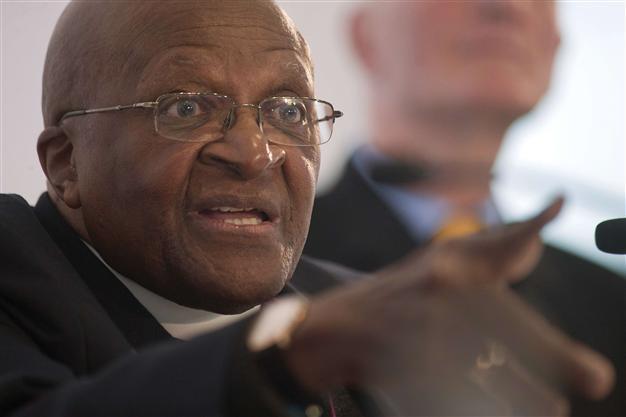I would not worship a homophobic God, South Africa's Tutu says
CAPE TOWN - Agence France-Presse

Archbishop Emeritus and Nobel Peace Laureate, Desmond Tutu (L) speaks, as Constitutional Court Judge, and openly gay man, Edwin Cameron listens at a press conference announcing the launch of Free & Equal, a United Nations global public education campaign for lesbian, gay, bisexual and transgender (LGBT) equality on July 26, 2013 in Cape Town. AFP PHOTO / RODGER BOSCH
South African peace icon Desmond Tutu on Friday said he would rather go to hell than worship a homophobic God, likening the fight against gay prejudice to the anti-apartheid struggle."I would refuse to go to a homophobic heaven. No, I would say sorry, I mean I would much rather go to the other place," the retired archbishop said at the launch of a United Nations gay equality campaign in Cape Town.
"I would not worship a God who is homophobic and that is how deeply I feel about this," he said, condemning the use of religious justification for anti-gay prejudice.
Launched by the UN Human Rights Office, the public education campaign "Free and Equal" aims to raise awareness of anti-gay violence and discrimination.
Tutu, a Nobel Peace Prize laureate, compared the project to the fight South Africans waged to end the former white racist minority rule, a struggle in which he played a pivotal role.
"I am as passionate about this campaign as I ever was about apartheid. For me, it is at the same level," the 81-year-old said.
UN High Commissioner for Human Rights Navi Pillay said same-sex relationships are illegal in more than a third of countries around the world and punishable by death in five.
Even in countries where gay rights are upheld challenges remain, she said, noting that South Africa has "some of the worst cases of homophobic violence" despite having some of the world's best legal protections.
The country has seen brutal, deadly attacks on lesbians, who also risk falling victim to what is known as "corrective rape".
A South African lesbian was last month found dead, having been sexually assaulted with a toilet brush.
"People are literally paying for their love with their lives," said Pillay.
The campaign, which aims to push for legal reforms and public education against homophobia, will have a strong focus on working with governments.
"I constantly hear governments tell me 'but this is our culture, our tradition and we can't change it'... So we have lots of work to do," said Pillay.
















